Americas: US Companies Rush to Convertibles
As political uncertainty continues in the US, the Federal Reserve has cut interest rates by 0.5%, and consequently investors and companies have become more pessimistic about the market which has resulted in a rising fear of a potential recession. As a result, a lot of companies have issued convertible bonds to finance themselves. In the first 9 months of 2019 US listed companies have raised $49.2bn via 107 convertible offerings, that is the highest first 9 months volume since the financial crisis of 2008 ($62.8bn via 105 deals in the first 9 months). 45.8% of the first 9 months volume came from the third quarter this year with $22.6bn out of $49.2bn. Technology, Healthcare and Utility are the top three sectors with the highest convertible issuance rate, aggregating to a combined volume of $38.1bn or 77.3% of the total convertible issuance in this first 9 months.

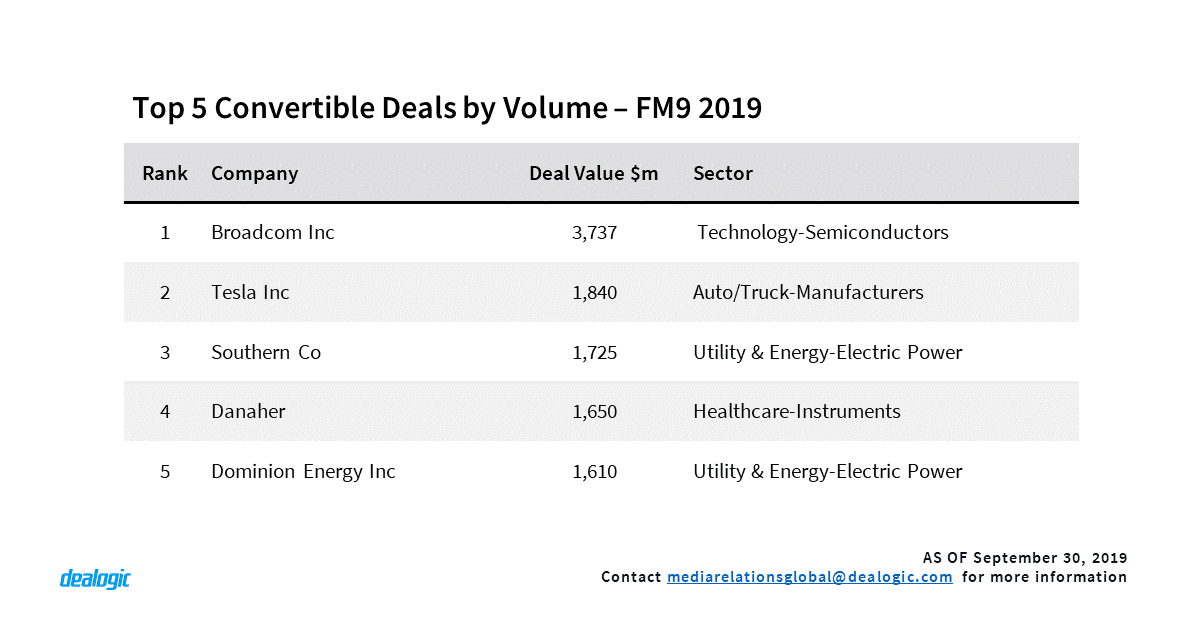
Americas: Signs of Slowdown in US IPO Activity
In the first 9 months of 2019 the US IPO market stood at $52.7bn via 155 deals, the highest first 9 months volume since 2014 ($77.6bn via 220 deals). While the volume is still good compared to previous years, signs of a slowdown in the US IPO market can already be detected in this quarter. Additionally, the overall negative macro environment has certainly started to impact the IPO market. Q3 2019 saw a 54.5% decrease in volume as merely $13.9bn was raised in this quarter compared to Q2 2019 which generated $30.5bn. US companies were mainly responsible for this decline, raising $11.6bn in this quarter, representing a 58.9% downturn in proceeds from Q2 2019 ($28.2bn).
SmileDirectClub Inc priced the largest US IPO for the Q3 of 2019 by raising $1.3bn listing on nasdaq, however, the company did not come out with a positive return since its share price plummeted by 27.5% just one day after the start of trade. This phenomenon had a tangible negative effect on the market. In addition to this, WeWork was set to debut in September on Nasdaq; however, reports about the valuation and maangement were so adverse that the much hyped IPO was withdrawn and it might bring about negative investor sentiment and discredit on other potential and upcoming IPOs of 2019.
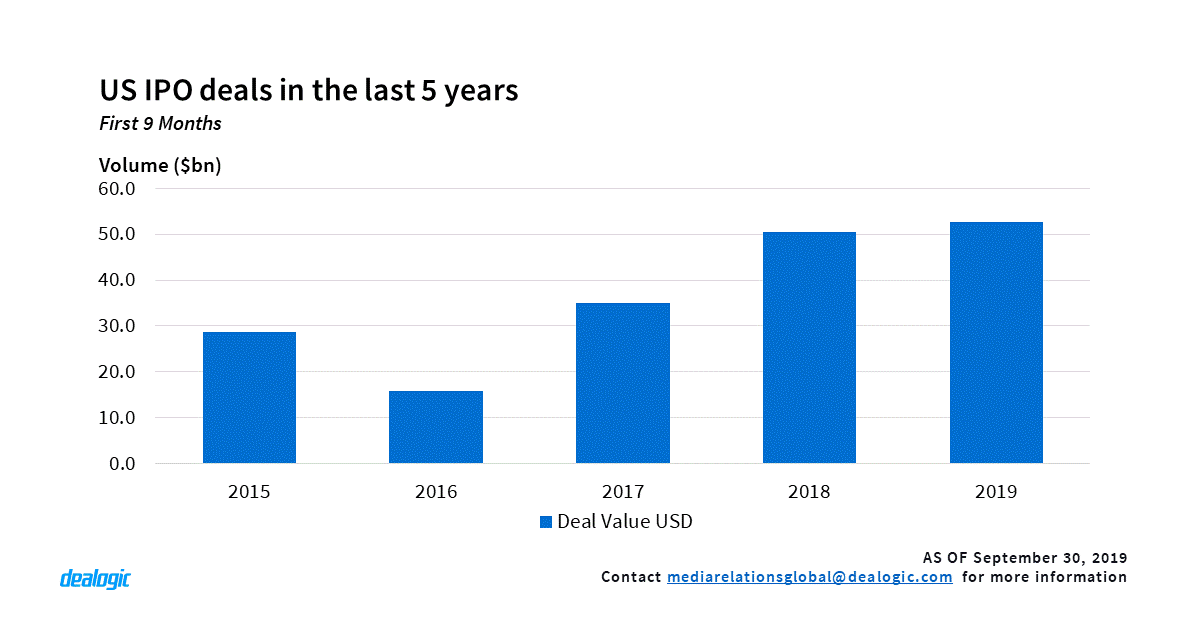
Americas: Highest Latam Follow-Ons since 2010
This year the Latam ECM market saw the highest first 9 months volume since 2013 ($28.3 bn via 62 deals), with $23.5bn raised via 58 deals, representing a 38.4% increase in proceeds from the first 9 months of 2018 ($17.0bn). Brazil accounts for 64.6% of the total Latam ECM market volume with $15.2bn issued – a more than a twofold increase in volume compared with the first 9 months of 2018 ($6.7bn).
BR Distribuidora priced the largest Latam follow-on deal in the first 9 months of 2019, raising $2.6bn through JPMorgan, Citi, BAML, CS, Itau and Santander. It is the largest deal since last year’s $2.6bn PagSeguro Digital Ltd IPO. While Latam IPO first 9-month volume dropped from $9.4bn in 2018 to $2.6bn in 2019, the follow-on market experienced a surge in both number and volume. Follow-ons generated $20.5bn in the first 9 months of 2019, representing a more than threefold increase from the first 9 months 2018 ($6.4bn), and the highest first 9 months follow-on volume since 2010 ($40.5bn).
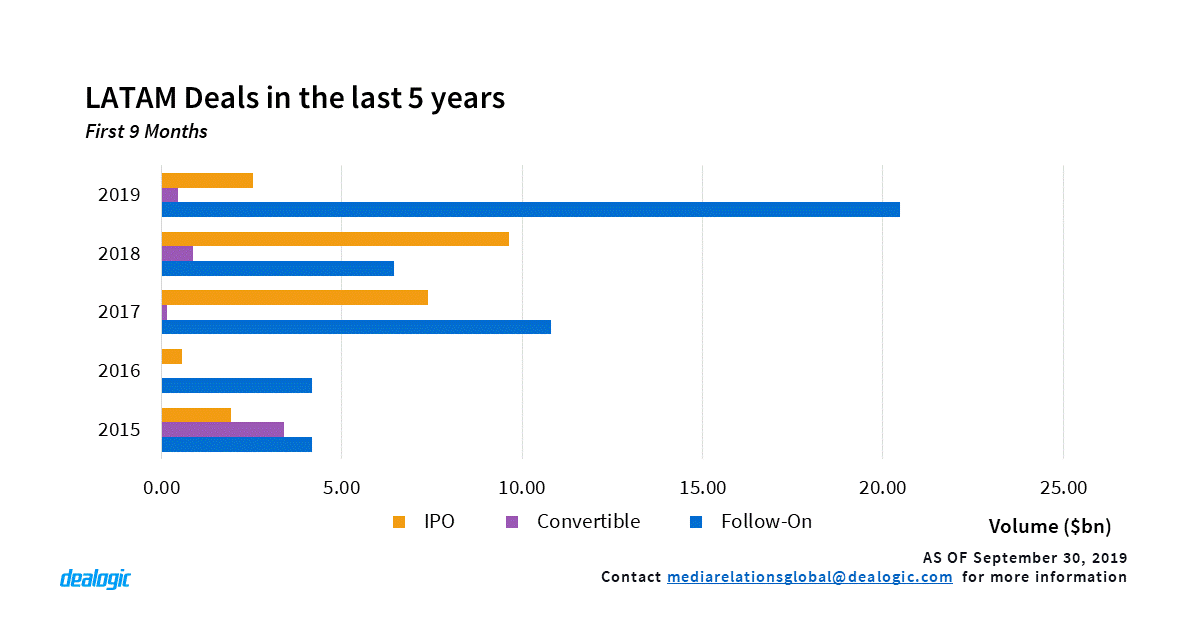
Asia-Pacific: Hong Kong New Listings – Winter in Summer
It was a ‘roller coaster’ winter for the Hong Kong equity/IPO market in Q3 2019. Only $1.6bn was raised from 14 companies in July and August, marking an 86% drop in volume and 62% decrease in activity compared to the same period (July & August) last year, and represented the lowest level since 2013. In July, Anheuser-Busch InBev withdrew the $9.8bn IPO of Budweiser Brewing Co APAC and pursued a direct sale of its Australian business to Asahi instead, raising $11.3bn. At that time, there was also a rumor that Alibaba would delay its secondary listing in Hong Kong, giving a gloomy outlook in the listing race.
A silver lining appeared in September, however, with the relaunch and pricing of the Budweiser Brewing Co APAC IPO raising $5.0bn, which could prompt other billion-dollar listings and see the end of the hibernation. Since 2012 Hong Kong has had an average of six $1bn+ listings per year but in 2019 there had been only two $1bn+ listings ($1.2bn Hansoh Pharmaceutical and $1.2bn Shenwan Hongyuan) through August, the lowest level since 2012. The resumption of listings gives HK a boost in the IPO race. At $16.2bn through 88 deals, HK stands at no. 3 behind NYSE and Nasdaq for first nine months of new listings.
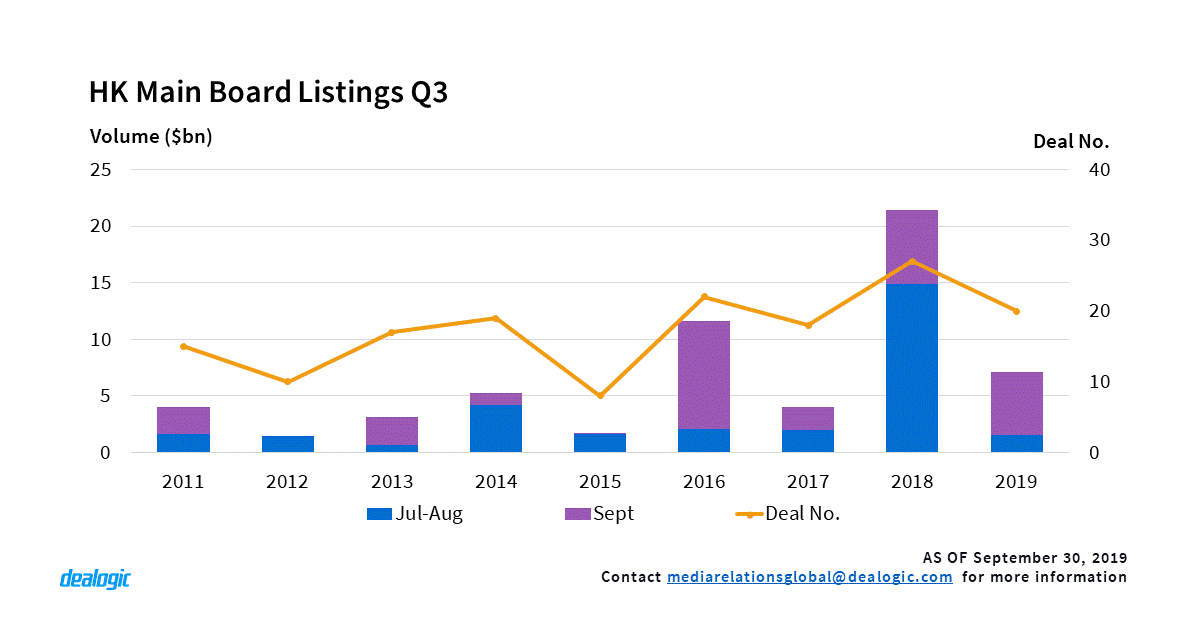
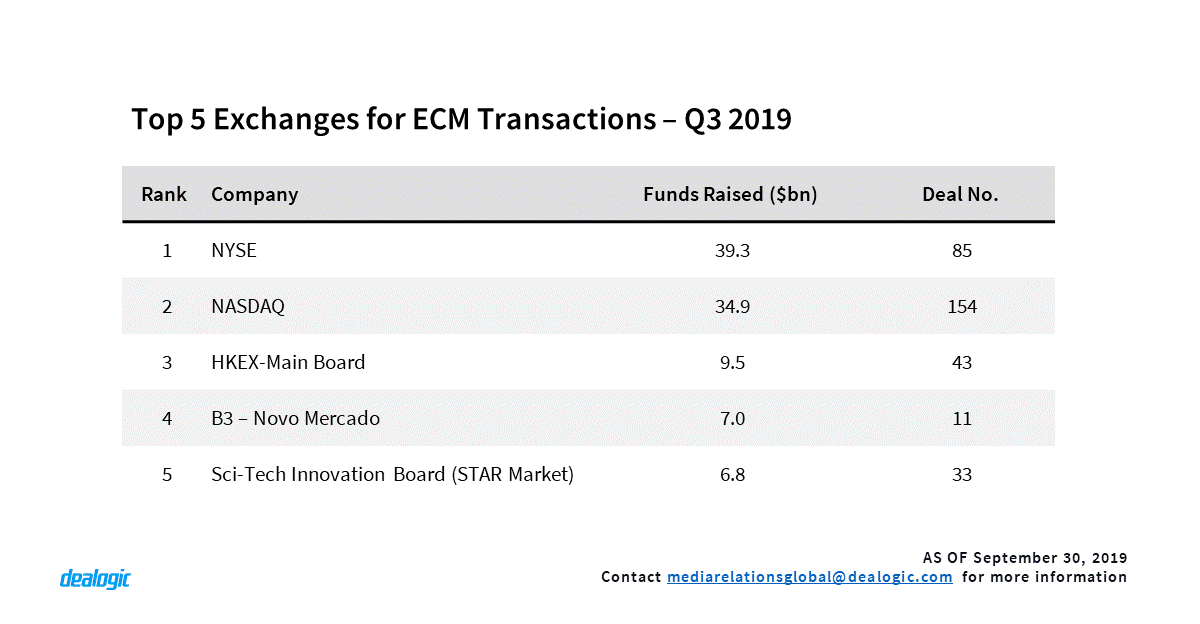
Asia-Pacific: Australian Placements Find their Place
Australian ECM volume has set the second lowest Q3 volume in the past 5 years, falling 40% from the same period in 2018. Q3 follow-on volume has raised $5.2bn through 256 deals, a 23.5% drop after reaching $6.2bn last quarter. Apart from the slowdown in follow-on issuance, the method of capital raising is also at a turning point with companies turning from entitlement offers to placements. Australian placements have already raised $7.3bn in the first 9 months, beating 2018 FY volume ($5.1bn) and 2019 Q3 is setting 2 times bounce back from 2018 Q3 ($1.5bn).
Led by a wave of placements launched last quarter that raised $2.9bn, placements have made up 57% of the overall follow-on volume in 2019 F9M. Starting with a barrage of placements from real estate companies in Q2 ($2.5bn via 11 deals), financial companies took over in Q3 by raising $1.2bn via 6 deals. On the other hand, entitlement offers, traditionally a deal structure employed by companies for large equity offerings, have contributed just $1.5bn in the first 9 months after raising $12.8bn in 2018. The largest entitlement offer so far this year is St Barbara’s non-renounceable accelerated entitlement offer ($339m) underwritten by Deutsche Bank in Q2. Entitlement offers now contribute 10.9% of the total follow-on volume, a drop from 62.8% in the same period last year.
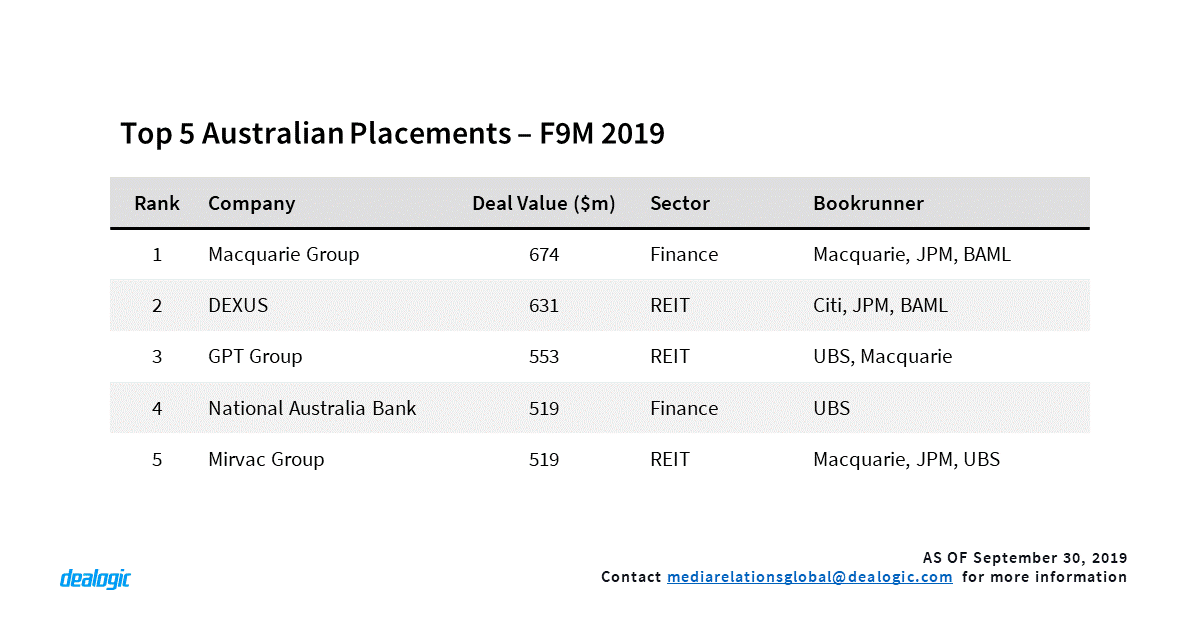
EMEA: ECM volume weakens to 7 year low
EMEA ECM issuers generated a total of $97.5bn via 926 transactions in the first 9 months of 2019, standing at a 7 year-low in proceeds since the first 9 months of 2012 ($96.9bn) and a 3 year-low in activity since the first 9 months of 2016 (906 transactions). Primary markets have not remained unaffected, given the ongoing geopolitical headwinds, with EMEA IPO volume and activity being at their lowest level for six and seven years respectively with $20.1bn via 119 IPOs ($19.5bn raised in first 9 months of 2013 and 108 IPOs were priced in first 9 months 2012).
The US -China trade dispute and the Brexit deadlock were not the only factors for the low IPO figures in EMEA. The summer hiatus hit the third quarter of the year, which ended with a 69% decrease in IPO proceeds compared to the previous quarter. Q3 2019 saw 31 new listings raising a total of £4.6bn, a 27% fall in proceeds and a 42.6% drop in activity compared to the same period last year. Q3 volume did receive a bump from Teamviewer’s $ 2.2bn and EQT Partners’ $1.3bn IPOs, being Q3’s second and fifth globally largest IPOs.
Despite the decline in volume and activity mentioned above, reasonable companies’ valuations and pricing levels against a backdrop of rising secondary markets contributed to a solid aftermarket performance ¹. Since the beginning of the year, FTSE 100, DAX and CAC have risen 10% ,17.4% and 21%, although Teamviewer’s price decrease on its first date of trading indicates that the EMEA IPO market remains shaky. The average 1-week return for EMEA IPOs in the first 9 months of the year stood at + 14.04%, representing a 7 year-high since the first 9 months of 2012 (+16.94%) and a sevenfold increase compared to the same period last year. The 1-week return ranged from -13.46% for the $659m Arabian Centres IPO to +142.41% for Jumia Technology’s $225m IPO.
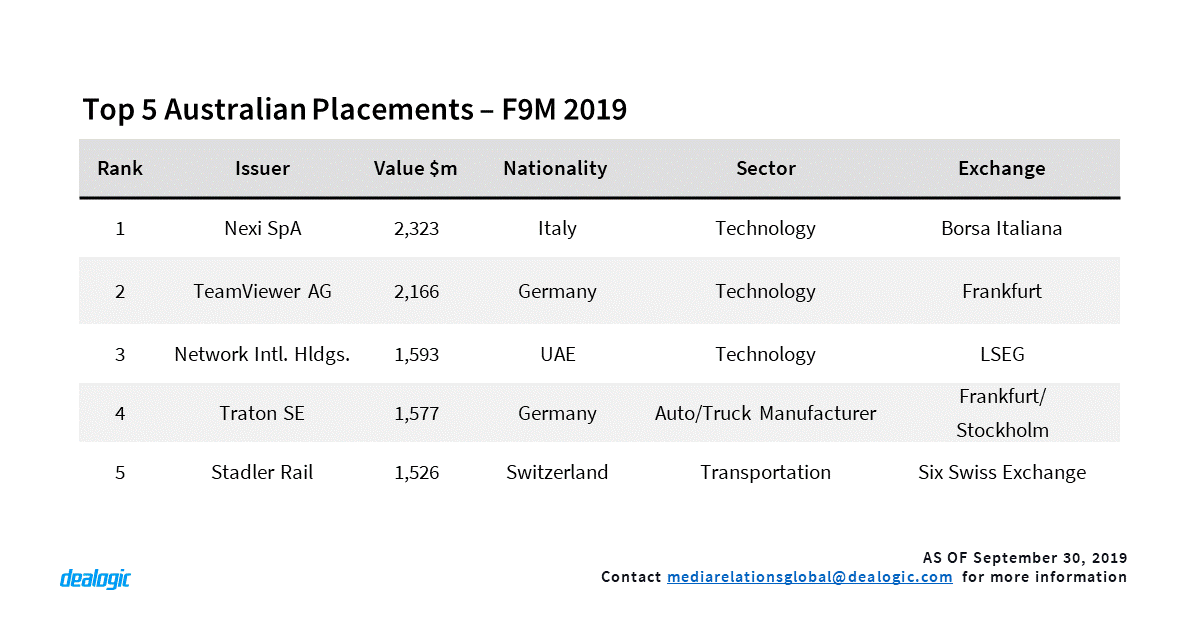
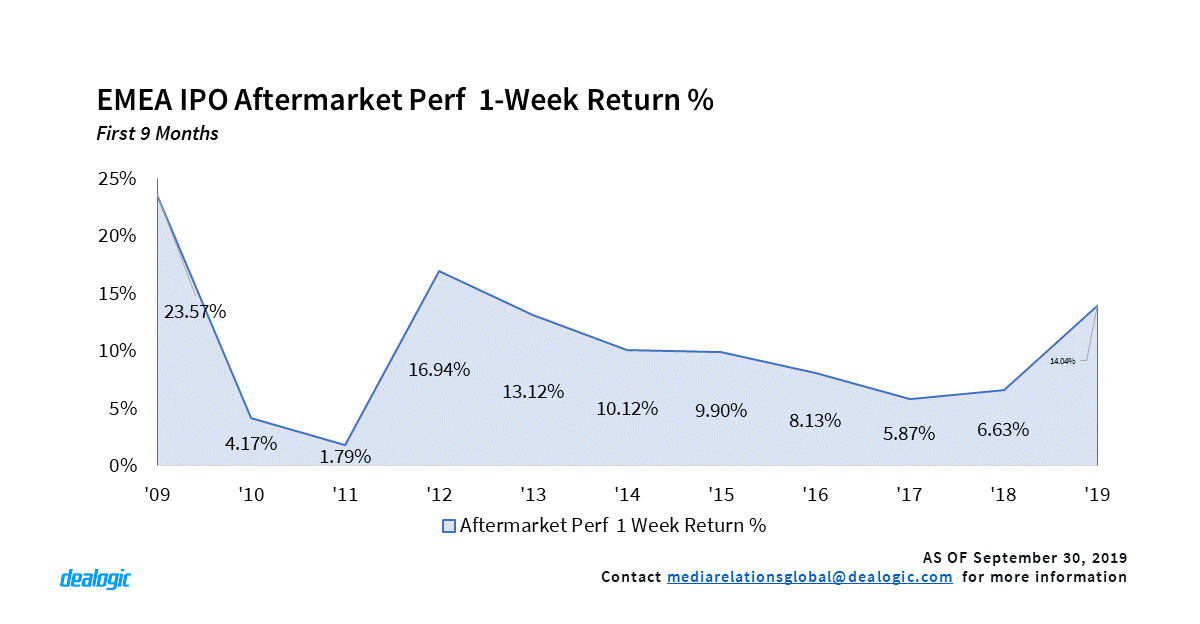
EMEA: Cross-Border IPO volume picks up
In the First 9 Months of 2019 EMEA cross-border² IPO volume accounted for 28% of the total EMEA IPO proceeds, the largest contribution since first 9 months 2011 (48%) representing an elevenfold surge compared with the same period last year. Boosted by Tech issuers, who contributed 51% and 50% to the regional cross-border IPO volume and activity respectively, EMEA issuers abroad generated a total of $5.7bn via 16 IPOs.
UK stock exchanges remained a main listing destination occupying first position in the EMEA cross-border IPO exchange nationality ranking with $2.4bn via 4 IPOs in the first 9 months of 2019. LSEG occupied the second position in activity, following US nationality exchanges, which hosted 6 EMEA issuers and generated $871m. UAE payment services companies; Network International ($1.6bn) and Finablr ($394m), dual listed Airtel Africa ($687m), and Irish drugs manufacturer Uniphar ($158m) were all welcomed onto the LSEG’s main and alternative boards over the quarter.
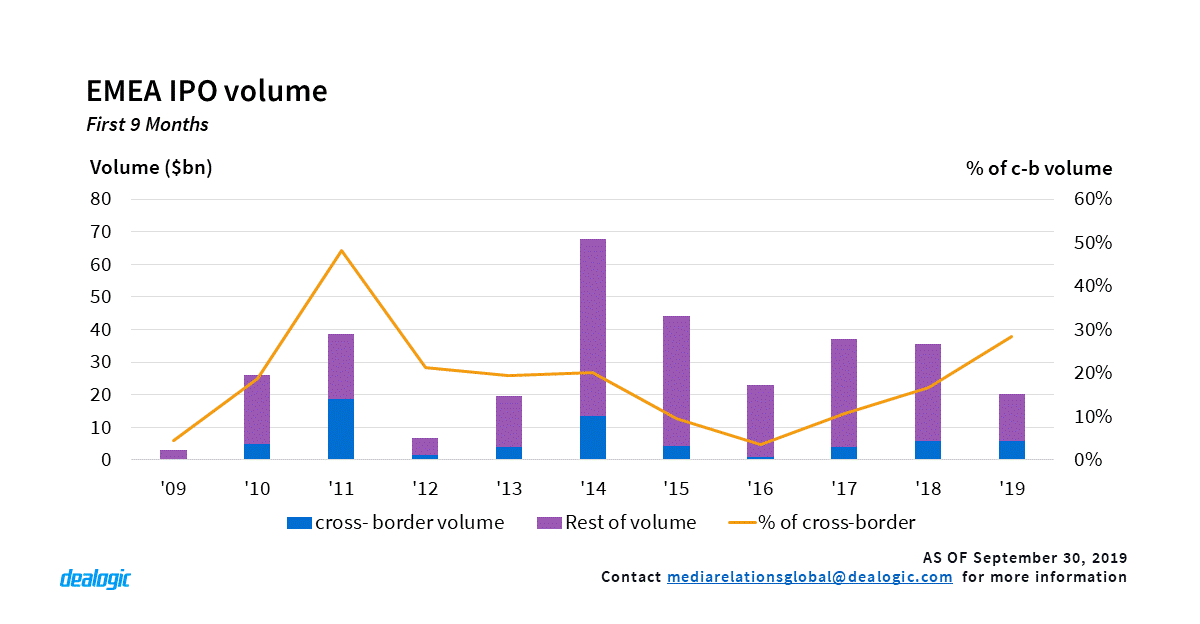
EMEA: Record high for Negative-yield convertibles
Q3 2019 witnessed an increase in negative-yield convertible offerings with 8 EMEA issuers raising a total of $5.0bn. The contribution of negative -yield issuance in the overall EMEA convertible proceeds and activity amounts to 97% and 67% respectively, the highest proportion ever in Q3. With bond yields across Europe going deeper in the negative-yield territory, both investors and issuers rushed for the benefits. While negative coupon allows issuers to pay back less than the amount they have borrowed, investors can take advantage from stock exposure they are given depending on the value of the underlying asset.
In the last fortnight of the quarter, French luxury retailer Kering SA issued a €598m($658m) three-year bond exchangeable into Puma SE at a yield to maturity of -2.76%, globally representing the most negative yielding debt of 2019 so far. This deal along with other negative-yield issues from; Edenred SA ($591m/ -1.53), Eliott Capital ($836m/-0.30%), and Veolia Environment ($798m/-0.60%) boosted the trend and saw EMEA issuers raise the most through negative-yield convertibles in the quarter, followed by issuers in APAC ($1.6bn via 5 deals) and the Americas ($350m via 1 deal).
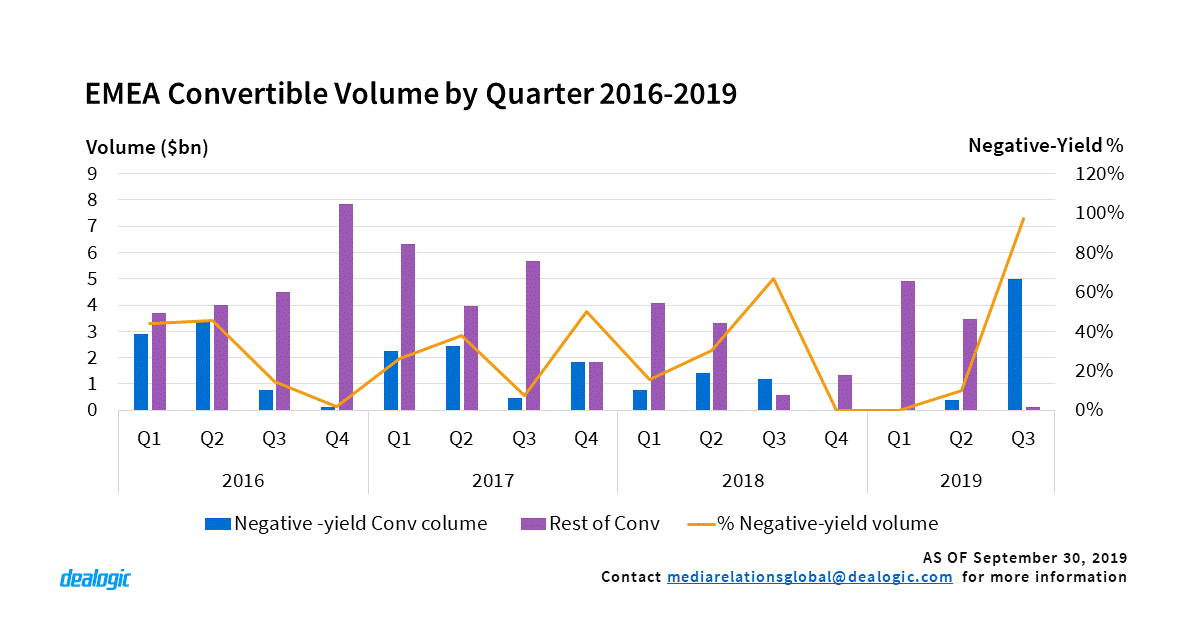
Footnote:
- Aftermarket performance includes IPOs>=USD50M
- Cross-Border=Companies listed on exchange with different nationality to the company
– Written by Dealogic ECM Research
Data source: Dealogic, as of September 30, 2019